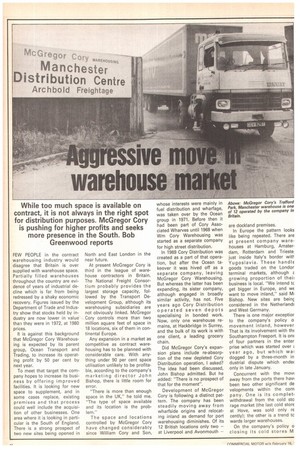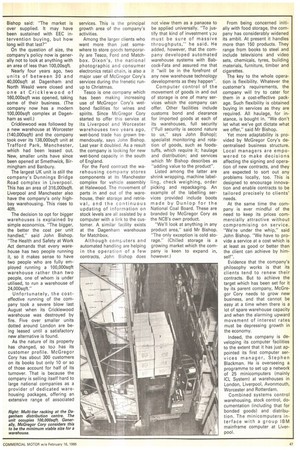ssive m öir
Page 48

Page 49

If you've noticed an error in this article please click here to report it so we can fix it.
warehouse marke
While too much space is available on contract, it is not always in the right spot for distribution purposes. McGregor Cory is pushing for higher profits and seeks more presence in the South. Bob Greenwood reports
FEW PEOPLE in the contract warehousing industry would disagree that Britain is over supplied with warehouse space. Partially filled warehouses throughout the country are evidence of years of industrial decline which is far from being redressed by a shaky economic recovery. Figures issued by the Department of Trade and Industry show that stocks held by industry are now lower in value than they were in 1972, at 1980 prices.
It is against this background that McGregor Cory Warehousing is expected by its parent group, Ocean Transport and Trading, to increase its operating profit by 50 per cent by next year.
To meet that target the company hopes to increase its business by offering improved facilities. It is looking for new space to supplement, and in some cases replace, existing premises and that process could well include the acquisition of other businesses. One area where it is looking in particular is the South of England. There is a strong prospect of two new sites being opened in North and East London in the near future.
At present McGregor Cory is third in the league of warehouse contractors in Britain. The National Freight Consortium probably provides the largest storage capacity, followed by the Transport Development Group, although its warehousing subsidiaries are not obviously linked. McGregor Cory controls more than two million square feet of space in 18 locations, six of them in continental Europe.
Any expansion in a market as competitive as contract warehousing has to be planned with considerable care. With anything under 90 per cent space utilisation unlikely to be profitable, according to the company's marketing director John Bishop, there is little room for error.
"There is more than enough space in the UK," he told me. "The type of space available and its location is the problem."
The space and locations controlled by McGregor Cory have changed considerably since William Cory and Son,
whose interests were mainly in fuel distribution and wharfage, was taken over by the Ocean group in 1971. Before then it had been part of Cory Associated Wharves until 1968 when Wm Cory Warehousing was started as a separate company for high street distribution.
In 1969 Cory Distribution was created as a part of that operation, but after the Ocean takeover it was hived off as a separate company, leaving McGregor Cory Warehousing. But whereas the latter has been expanding, its sister company, although engaged in broadly similar activity, has not. Five years ago Cory Distribution operated seven depots specialising in bonded work. Now, only one warehouse remains, at Hackbridge in Surrey, and the bulk of its work is with one client, a leading grocery chain.
Did McGregor Cory's expansion plans include re-absorption of the new depleted Cory Distribution operation, I asked? The idea had been discussed, John Bishop admitted. But he added: "There is no prospect of that for the moment".
Development of McGregor Cory is following a distinct pattern. The company has been steadily moving away from wharfside origins and relocating inland as demand for port warehousing diminishes. Of its 12 British locations only two — at Liverpool and Avonmouth — are dockland premises.
In Europe the pattern looks like being repeated. There are at present company warehouses at Hamburg, Amsterdam, Rotterdam and Trieste just inside Italy's border with Yugoslavia. These handle goods traded on the Londor terminal markets, although growing proportion of their business is local. "We intend tc get bigger in Europe, and WE want to move inland," said Mr Bishop. New sites are beinc considered in the Netherland( and West Germany.
There is one major exceptior to the company's policy o movement inland, however That is its involvement with th( Southampton Freeport. It is on( of four partners in the enter prise which was started over ( year ago, but which war dogged by a three-month in dustrial dispute which ende( only in late January.
Concurrent with the movi away from the ports there havi been two other significant de velopments within the corn pany. One is its completi withdrawal from the cold sto rage market (the last cold store at Hove, was sold only re cently); the other is a trend tc wards larger warehouses.
On the company's policy o closing its cold stores M Bishop said: "The market is over supplied. It may have been sustained with EEC intervention buying, but how long will that last?"
On the question of size, the company's policy now is generally not to look at anything with an area of less than 100,00sqft.
Nearly four years ago, two units of between 30 and 40,000sqft at Dagenham and North Weald were closed and one at Cricklewood of 160,000sqft was opened, taking some of their business. (The company now has a modern 100,000sqft complex at Dagenham as well.) Cricklewood was followed by a new warehouse at Worcester (140,000sqft) and the company took over its 138,000sqft unit at Trafford Park, Manchester, which had been leased out. New, smaller units have since been opened at Smethwick, Birmingham and Banbury.
The largest UK unit is still the company's Dunnings Bridge Road complex in Liverpool. This has an area of 316,000sqft. Liverpool and Manchester also have the company's only highbay warehousing. This rises to 40ft.
The decision to opt for bigger warehouses is explained by simple economics. "The bigger, the better the cost per unit handled," said John Bishop. "The Health and Safety at Work Act demands that every warehouse has two people running it, so it makes sense to have two people who are fully employed running a 100,000sqft warehouse rather than two people, one of whom is under utilised, to run a warehouse of 24,000sqft."
Unfortunately, the costeffective running of the company took a severe blow last August when its Cricklewood warehouse was destroyed by fire. Five over smaller units dotted around London are being leased until a satisfactory new alternative is found.
As the nature of its property has changed, so to has its customer profile. McGregor Cory has about 300 customers on its books but only 10 or so of those account for half of its turnover. That is because the company is selling itself hard to large national companies as a provider of dedicated warehousing packages, offering an extensive range of associated services. This is the principal growth area of the company's activities.
Among the larger clients who want more than just some where to store goods temporar ily are Tesco, Ford and Matchbox. Dixon's, the national photographic and consumer electronics retail chain, is also a major user of McGregor Cory's services during the frenetic runup to Christmas.
Tesco is one company which has been making increasing use of McGregor Cory's wet bond facilities for wines and spirits. Since McGregor Cory started to offer this service at its Liverpool and Worcester warehouses two years ago, wet-bond trade has grown tre mendously, says John Bishop. Last year it doubled. As a result the company is looking for new wet-bond capacity in the south of England.
For the Ford contract the warehousing company stores components at its Manchester complex for vehicle assembly at Halewood. The movement of parts in and out of the ware house, their storage and retrieval, and the continuous updating of information on stock levels are all assisted by a computer with a link to the cus tomer. A similar facility exists at the Dagenham warehouse for Matchbox.
Although computers and automated handling are helping in the operation of a few contracts, John Bishop does not view them as a panacea to be applied universally. "To justify that kind of investment ydu must be sure of massive throughputs," he said. He added, however, that the company developed automated warehouse systems with Babcock-Fata and assured me that it "will be in the forefront of any new warehouse technology developments as they happen".
Computer control of the movement of goods in and out of storage is one of many services which the company can offer. Other facilities include customs bond and clearance for imported goods at each of its warehouses, full security ("Full security is second nature to us," says John Bishop); specialist monitoring and rotation of goods, such as foodstuffs, which require it; haulage and distribution; and services which Mr Bishop describes as "adding value to the product".
Listed among the latter are shrink wrapping, machine labelling, check weighing, order picking and repackaging. An example of the labelling services provided include boots made by Dunlop for the National Coal Board. These are branded by McGregor Cory as the NCB's own product.
"We'll book at anything in any product area," said Mr Bishop. "The only exception is cold storage." (Chi:led storage is a growing market which the company is keen to expand in, however.) From being concerned initially with food storage, the company has considerably widened its ambit. At present it handles more than 150 products. They range from books to steel and include televisions and video sets, chemicals, tyres, building materials, furniture, timber and cigarettes.
The key to the whole operation is flexibility. Whatever the customer's requirements, the company will try to cater for them in a cost-effective package. Such flexibility is obtained buying in services as they are required. All haulage, for instance, is bought in. "We don't let what we've got dictate what we offer," said Mr Bishop.
Yet more adaptability is provided by McGregor Cory's decentralised business structure. Local managers are empowered to make decisions affecting the signing and operation of new contracts, and they are expected to sort out any problems locally, too. This is designed to encourage innovation and enable contracts to be tailored precisely to clients' needs.
At the same time the company is ever mindful of the need to keep its prices commercially attractive without compromising on service, "We're under the whip," said John Bishop. "We have to provide a service at a cost which is at least as good or better than the client can achieve by himself".
Evidence that the company's philosophy works is that its clients tend to renew their contracts. But to achieve the target which has been set for it by its parent company, McGregor Cory needs to grow new business, and that cannot be easy at a time when there is a lot of spare warehouse capacity and when the alarming upward movement of interest rates must be depressing growth in the economy.
Indeed, the company is developing its computer facilities to the extent that it has just appointed its first computer services manager, Stephen Blackman. He is overseeing a programme to set up a network of 25 minicomputers (mainly ICL System) at warehouses in London, Liverpool, Avonmouth, Worcester and Rotterdam.
Combined systems control warehousing, stock control, documentation (including that for bonded goods) and distribution. The minicomputers interface with a group IBM mainframe computer at Liverpool.




























































































